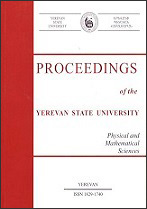|
|
Proceedings of the Yerevan State University, series Physical and Mathematical Sciences, 2017, Volume 51, Issue 1, Pages 66–70
(Mi uzeru333)
|
 |
|
 |
This article is cited in 1 scientific paper (total in 1 paper)
Physics
Effect of ligand binding on functionality of DNA field-effect transistor
E. Sh. Mamasakhlisova, A. P. Antonyanb, A. A. Akopyanc
a Chair of Molecular Physics YSU, Armenia
b Chair of Biophysics YSU, Armenia
c Institute of Radiophysics and Electronics, Ashtarak, Armenia
Abstract:
Motivated by the prospects of developing DNA field-effect transistors, as tools for a variety of application fields such as medical diagnostics, environmental pollutants monitoring, biological weapons defense, and taking into account that the efficiency of DNA-sensors depends on the precise prediction of experimental parameters responsible for thermostability of nucleic acids duplexes and specific times of formation of DNA duplexes, we analyze the factors influencing both the thermodynamics of hybridization and the stability of DNA–DNA and DNA–RNA duplexes. In this work the case of competition-free DNA hybridization is analyzed. It is shown how the intercalating ligands effectively increase the binding constant for the target sequences and thus affects the sensitivity of the DNA-chip.
Keywords:
ligand binding, thermostability, hybridization, DNA-chip.
Received: 01.12.2016
Revised: 30.01.2017
Citation:
E. Sh. Mamasakhlisov, A. P. Antonyan, A. A. Akopyan, “Effect of ligand binding on functionality of DNA field-effect transistor”, Proceedings of the YSU, Physical and Mathematical Sciences, 51:1 (2017), 66–70
Linking options:
https://www.mathnet.ru/eng/uzeru333 https://www.mathnet.ru/eng/uzeru/v51/i1/p66
|

| Statistics & downloads: |
| Abstract page: | 147 | | Full-text PDF : | 35 | | References: | 25 |
|




 Contact us:
Contact us: Terms of Use
Terms of Use
 Registration to the website
Registration to the website Logotypes
Logotypes








 Citation in format
Citation in format 
